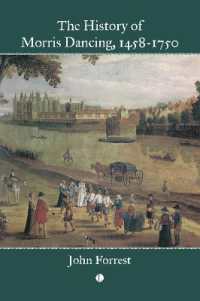Full Description
Anthropologists of religion study themes central to the understanding of humanity, such as the power of ritual, the authority of language, and the exemplary character of myth. This Handbook brings together leading specialists to explain the historical and intellectual background to how anthropologists approach religion, and to show why its study remains a dynamic means of reflecting on contemporary life around the globe. Each chapter combines overviews of a given topic with original observations, and the Handbook is structured for ease of teaching. Five sections guide the reader on different routes through the field, helping to provoke further questions on historical and intellectual approaches; 'Indigenous' religions; 'World' religions; enduring themes; and emergent themes. The aim is to help students and researchers recognize how and why the field has been organized in certain ways, but also to make them feel confident enough to challenge its assumptions and to consider directions it might go in the future. This Handbook provides an excellent introduction to some of the most important elements of anthropology, including the discipline's emphases on comparison, embodied experience, and scepticism toward taken-for-granted categories. It also shows how religious practices remain entangled with some of the pressing themes and questions of our time, including how we perceive and treat our environment, ways in which we deal with religious and cultural differences, and the religious dimensions of virtual and mediated means of communication.
Contents
Simon Coleman and Joel Robbins: Introduction: On the Virtues of 'Reading Across'
Section 1: Approaches
1: Alexander Riley: The French Tradition
2: Ivan Strenski: Victorian Anthropologies of Religion: Their Puzzles and Problems
3: Matt Tomlinson: Cultural Analysis
4: Courtney Handman: Linguistic Approaches
5: Peter Stromberg: Narrative Analysis
6: Christopher Stephan and C. Jason Throop: Phenomenological Analysis
7: Joseph Webster: Approaches through Materiality
8: Carles Salazar: Cognitive Approaches
9: Brian M. Howell: Insiders and Outsiders in the Anthropology of Christianity
Section 2: The Study of 'Indigenous Religions'
10: Joseph Hellweg and Dianna Bell: Person, Cosmos, and Power in the Anthropology of Religions in Africa: An Interdisciplinary Approach to Theory and Ethnography
11: Aprecida Vilaça: An Unstable 'Religion': Shamanism, Perspectivism, and 'Perpetual Disequilibrium' in Amazonia
12: John Barker and Dan Jorgensen: Melanesia
13: Robert W. Hefner: An Anthropology of Religion and Modernity Across Eastern Asia
14: Carolyn Schwarz: Religions of Aboriginal Australia
15: Meaghan Weatherdon and Pamela E. Klassen: The Study of Indigenous Religions in North America
Section 3: 'World Religions' Revisited
16: Jonathan Mair: The Anthropology of Buddhism
17: David N. Gellner: Living with Polytropy and Hierarchy: The Anthropology of Hinduism
18: Anne Vallely: Jainism
19: Magnus Marsden: The Anthropology of Islam
20: Don Seeman and Nehemia A. Stern: Anthropology, Judaism, and Jews
21: Ruy Llera Blanes and Annelin Eriksen: Arguing with Christianity: Pentecostalism as a Challenge for Anthropology
Section 4: Enduring Themes
22: Isak Niehaus: Magic and Witchcraft: Changing Anthropological Interpretations
23: Andrew J. Strathern and Pamela J. Stewart: Ritual: Revivals and Excursions
24: Jon P. Mitchell: Belief
25: Sonja Luehrmann: The Secular and the Sacred
26: James S. Bielo: Religion and Science
27: Anna I. Corwin and Jessica Hardin: Religion and Medicine: Productive Contrasts and their Limitations
28: Nicholas H.A. Evans: Morality
29: Susan J. Rasmussen: Spirit Possession and Religion: Excavating the Unexpected in an Uneasy Relationship
30: Morten Axel Pedersen: Shamanism
31: Britt Halvorson: Religion and Economies: Four Cultural Articulations and Their Insights
32: Susan Sared: Gender and Religion
33: Deborah Van Heerken: Myth
34: Pnina Werbner and Richard Werbner: Charisma
35: Jacob R. Hickman and Joseph Webster: Millenarianism
Section 5: Emergent Themes
36: Ursula Rao: Religion and the Public Sphere
37: Jon Bialecki: Virtual Religion
38: Knut Rio: Religion, Globalization, and Universalism
39: Tom Boylston: Religion and Media (Human Communication, with a Loop in it)
40: Julia L. Cassaniti: Emotion in the Anthropology of Religion
41: Allen Abramson: Plural Entirety: Anthropology, Cosmology, and the 'Unnatural' Study of Human Worlds








